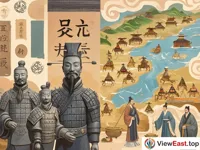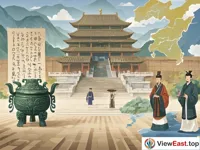



On the ancient and mysterious land of China, the river of history flows gently, witnessing countless transformations and cultural integrations. From the dawn of civilization to the splendor of feudalism, and then to the modern changes, every pulse of ancient Chinese history has profoundly influenced the course of human civilization. This article will take you through time and space to comprehensively understand the historical changes and rich culture of ancient China.
1. Ancient Legends and the Dawn of Civilization
The stage of ancient Chinese history slowly opens in the mysterious legends. The legendary Three Sovereigns and Five Emperors, such as Fuxi, Shennong, and the Yellow Emperor, symbolize the dawn of civilization. These legendary figures not only represent the ancient Chinese people's exploration of nature and the universe but also reflect the initial formation of social structure and moral concepts.
2. Xia, Shang, and Zhou: The Foundation of Feudalism
As time went by, China entered a historical period with written records. The Xia Dynasty is considered the first dynasty in Chinese history, although its existence still has a certain legendary color. The Shang Dynasty is famous for its oracle bone script and bronze ware, marking the further development of civilization. The Zhou Dynasty laid the foundation for the feudal system, and the implementation of the enfeoffment system allowed the formation and development of various vassal states, while also nurturing the rudiments of Confucianism.
3. Spring and Autumn and Warring States: The Blossoming of Philosophy and Thought
The Spring and Autumn and Warring States period was an era full of change and ideological collisions in Chinese history. During this period, various schools of thought such as Confucianism, Taoism, and Legalism emerged one after another, greatly enriching China's cultural tradition. At the same time, the wars of hegemony among the states also promoted the development of military strategy and political systems.
4. Qin and Han: Unification and Expansion of the Empire
Emperor Qin Shi Huang unified the six states, ending a long period of division and establishing a centralized empire. The series of reforms he implemented, such as the unification of weights and measures, script, and laws, had a profound impact on Chinese history. The Han Dynasty inherited and developed the Qin Dynasty's system, opened up the Silk Road, promoted cultural exchanges between the East and the West, and Confucian thought became the official ideology, influencing future generations for thousands of years.
5. Three Kingdoms, Jin, and Northern and Southern Dynasties: Division and Integration
The Three Kingdoms period, with the tripartite stand-off between Wei, Shu, and Wu, is a legendary era full of heroes in Chinese history. The subsequent Jin and Northern and Southern Dynasties period, although the regime was divided, was also a period of great ethnic integration. The cultural exchanges and integration among various ethnic groups laid the foundation for the unification of the Sui and Tang dynasties.
6. Sui and Tang: The Splendor of the Golden Age
The Sui Dynasty, although short-lived, excavated the Grand Canal, which is still in use today. The Tang Dynasty was a period of cultural, economic, and military prosperity in Chinese history. The Tang Dynasty's open policy attracted merchants and scholars from all over the world, making Chang'an an international metropolis. Tang poetry is a treasure of Chinese literature, influencing countless literati and poets in later generations.
7. Song and Yuan: The Commercial Revolution and Ethnic Relations
During the Song Dynasty, the economy and technology of China reached a new height, especially the rise of the commercial revolution, which greatly developed the urban economy and handicraft industry. The Yuan Dynasty was an empire established by the Mongols, and its vast territory promoted exchanges across the Eurasian continent, while also complicating ethnic relations.
8. Ming and Qing: The Last Feudal Dynasties
The Ming Dynasty's political system further matured, but it also faced external pressures. The Qing Dynasty was the last feudal dynasty in Chinese history. It reached its peak under the rule of three emperors, Kangxi, Yongzheng, and Qianlong, but it also sowed the seeds of decline.
9. Conclusion
Every change in ancient Chinese history is a profound contribution to human civilization. From philosophical thought to literature and art, from technological inventions to social systems, China's history has not only shaped the character of a nation but also influenced the course of the world. Through the millennia of historical rivers, we can still feel the charm and wisdom of those ancient stories.